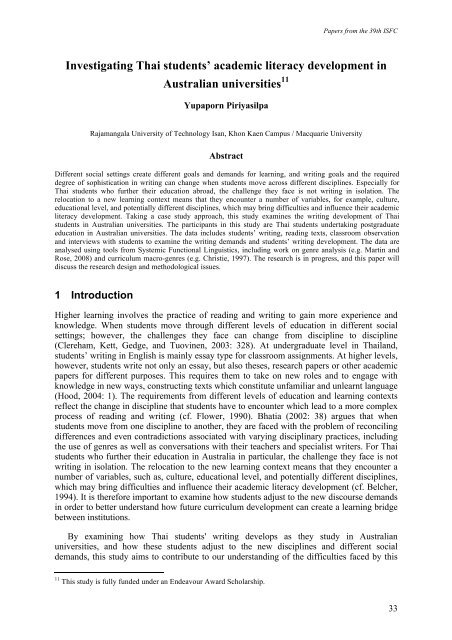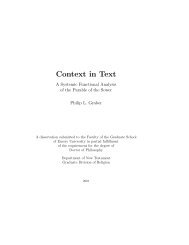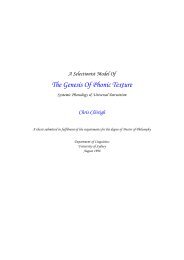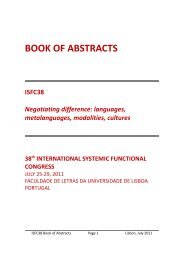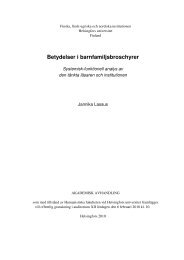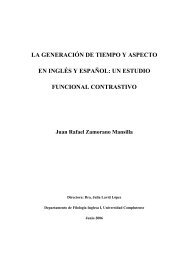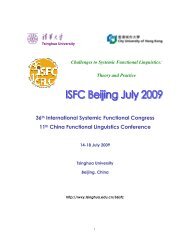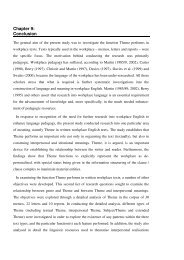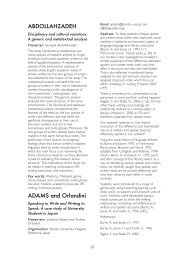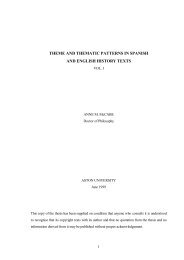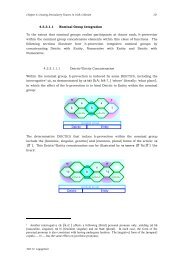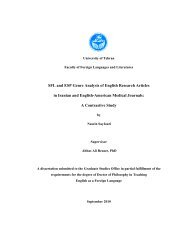the ISFC39 Proceedings - International Systemic-Functional ...
the ISFC39 Proceedings - International Systemic-Functional ...
the ISFC39 Proceedings - International Systemic-Functional ...
Create successful ePaper yourself
Turn your PDF publications into a flip-book with our unique Google optimized e-Paper software.
Papers from <strong>the</strong> 39th ISFCInvestigating Thai students’ academic literacy development inAustralian universities 11Yupaporn PiriyasilpaRajamangala University of Technology Isan, Khon Kaen Campus / Macquarie UniversityAbstractDifferent social settings create different goals and demands for learning, and writing goals and <strong>the</strong> requireddegree of sophistication in writing can change when students move across different disciplines. Especially forThai students who fur<strong>the</strong>r <strong>the</strong>ir education abroad, <strong>the</strong> challenge <strong>the</strong>y face is not writing in isolation. Therelocation to a new learning context means that <strong>the</strong>y encounter a number of variables, for example, culture,educational level, and potentially different disciplines, which may bring difficulties and influence <strong>the</strong>ir academicliteracy development. Taking a case study approach, this study examines <strong>the</strong> writing development of Thaistudents in Australian universities. The participants in this study are Thai students undertaking postgraduateeducation in Australian universities. The data includes students’ writing, reading texts, classroom observationand interviews with students to examine <strong>the</strong> writing demands and students’ writing development. The data areanalysed using tools from <strong>Systemic</strong> <strong>Functional</strong> Linguistics, including work on genre analysis (e.g. Martin andRose, 2008) and curriculum macro-genres (e.g. Christie, 1997). The research is in progress, and this paper willdiscuss <strong>the</strong> research design and methodological issues.1 IntroductionHigher learning involves <strong>the</strong> practice of reading and writing to gain more experience andknowledge. When students move through different levels of education in different socialsettings; however, <strong>the</strong> challenges <strong>the</strong>y face can change from discipline to discipline(Clereham, Kett, Gedge, and Tuovinen, 2003: 328). At undergraduate level in Thailand,students’ writing in English is mainly essay type for classroom assignments. At higher levels,however, students write not only an essay, but also <strong>the</strong>ses, research papers or o<strong>the</strong>r academicpapers for different purposes. This requires <strong>the</strong>m to take on new roles and to engage withknowledge in new ways, constructing texts which constitute unfamiliar and unlearnt language(Hood, 2004: 1). The requirements from different levels of education and learning contextsreflect <strong>the</strong> change in discipline that students have to encounter which lead to a more complexprocess of reading and writing (cf. Flower, 1990). Bhatia (2002: 38) argues that whenstudents move from one discipline to ano<strong>the</strong>r, <strong>the</strong>y are faced with <strong>the</strong> problem of reconcilingdifferences and even contradictions associated with varying disciplinary practices, including<strong>the</strong> use of genres as well as conversations with <strong>the</strong>ir teachers and specialist writers. For Thaistudents who fur<strong>the</strong>r <strong>the</strong>ir education in Australia in particular, <strong>the</strong> challenge <strong>the</strong>y face is notwriting in isolation. The relocation to <strong>the</strong> new learning context means that <strong>the</strong>y encounter anumber of variables, such as, culture, educational level, and potentially different disciplines,which may bring difficulties and influence <strong>the</strong>ir academic literacy development (cf. Belcher,1994). It is <strong>the</strong>refore important to examine how students adjust to <strong>the</strong> new discourse demandsin order to better understand how future curriculum development can create a learning bridgebetween institutions.By examining how Thai students' writing develops as <strong>the</strong>y study in Australianuniversities, and how <strong>the</strong>se students adjust to <strong>the</strong> new disciplines and different socialdemands, this study aims to contribute to our understanding of <strong>the</strong> difficulties faced by this11 This study is fully funded under an Endeavour Award Scholarship.33


